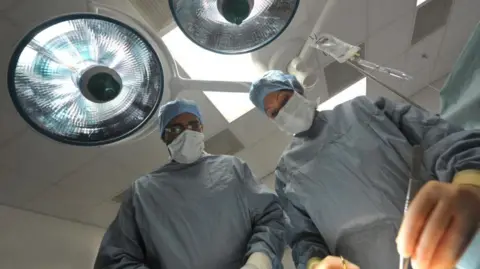Is it possible to become immortal with the help of organ transplants? That was the unexpected topic of discussion this week between Chinese President Xi Jinping and Russian President Vladimir Putin when they met at a military parade in Beijing.
A translator, speaking in Mandarin on behalf of Putin, told Xi how human organs can be repeatedly transplanted so that one can get younger and younger in spite of age, and might even be able to stave off old age indefinitely.
It's predicted that in this century it might become possible to live to 150, he added.
Their smiles and laughter suggest it was a bit of banter, but might they be on to something?
Organ transplants certainly save lives - in the UK, over 100,000 people have been saved in the last 30 years, says NHS Blood and Transplant.
And continued advancements in medicine and technology mean transplanted organs are lasting far longer once in people. Some patients have had a kidney transplant that has kept working for more than 50 years.
But having surgery is a big undertaking, with significant risks. Each time you go under the knife you are rolling the dice.
Currently, people who get a new organ also have to take strong anti-rejection drugs called immunosuppressants for life. These can have side-effects, such as high blood pressure, and increase the risk of infections.
Putin and Xi may be talking about having multiple organs transplanted and perhaps repeatedly.
Scientists are working on making rejection-free organs, using genetically-altered pigs as donors, and other innovative techniques like growing organs using human stem cells. Though these advancements are promising, the conversation around using them for extreme longevity remains cautious.
Prof Neil Mabbott, an expert in immunopathology, suggests focusing on healthy aging rather than simply extending life. He remarks, Living a lot longer, but suffering from multiple ailments is not an attractive way to spend retirement!




















